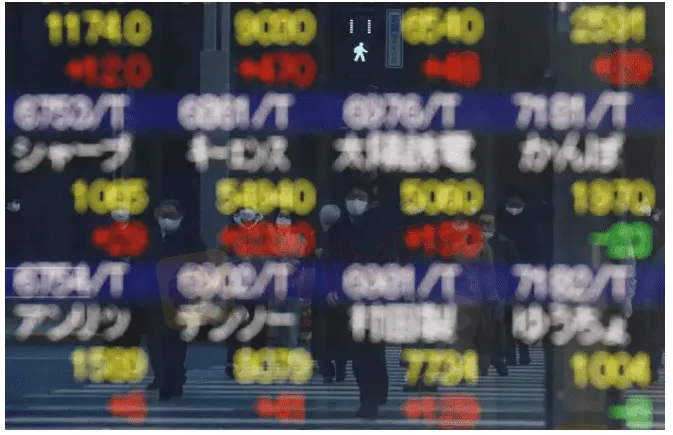简体中文
繁體中文
English
Pусский
日本語
ภาษาไทย
Tiếng Việt
Bahasa Indonesia
Español
हिन्दी
Filippiiniläinen
Français
Deutsch
Português
Türkçe
한국어
العربية
Asian stocks skid, bond yields up after hawkish Fed comments
Abstract:Asian share markets slipped on Wednesday as investors faced up to the possibility of aggressive monetary tightening by the U.S. Federal Reserve to fight inflation, while focus was also on new Western sanctions against Russia over its invasion of Ukraine.

Asian share markets slipped on Wednesday as investors faced up to the possibility of aggressive monetary tightening by the U.S. Federal Reserve to fight inflation, while focus was also on new Western sanctions against Russia over its invasion of Ukraine.
U.S. Treasury yields hit multi-year highs and stock markets were red after Fed Governor Lael Brainard said overnight that she expected a combination of interest rate rises and a rapid balance sheet runoff to take U.S. monetary policy to a “more neutral position” later this year.
In morning trade in Asia, Japans Nikkei shed nearly 2.0%, while South Korean shares fell 0.9% and Australian shares lost 0.75%.
MSCIs broadest index of Asia-Pacific shares outside Japan skidded 1.3%.
Hong Kongs Hang Seng index was down 1.3%, moving away from a one-month high hit on Monday. Shanghai lost 0.1% as markets in mainland China reopened after two days of public holidays.
Activity in Chinas services sector shrank at the steepest pace in two years in March as a local Omicron surge restricted mobility and weighed on client demand, a closely watched private sector survey showed on Wednesday.
On Tuesday, Chinese authorities extended a COVID-19 lockdown in Shanghai to cover all of the financial centres 26 million people, despite growing anger over quarantine rules in the city.
Investors‘ focus on Wednesday will be on the release of minutes from the Fed’s last policy meeting, which they are expected to scrutinise for clues on the prospect of a 50 basis point hike at the U.S. central banks next meeting in May.
“It‘s currently considered an 80% chance the Fed will take that course,” said Kyle Rodda, a market analyst at IG in Melbourne. Investors hadn’t fully priced in such a move, so greater evidence for it may move markets, Rodda added.
“Theres expectation the Fed could hike 50 bps in June too, and if that becomes more likely, then a repricing of those risks could spark another spike in volatility,” he said.
The European Central Bank will publish its minutes on Thursday.
Investors were also waiting to see how a fresh round of Western sanctions on Russia would play out.
The United States and its allies will on Wednesday impose new sanctions on Russian banks and officials and ban new investment in Russia, the White House said.
The yield on benchmark 10-year Treasury notes continued to move higher, hitting a two-year high of 2.6120% before coming down slightly. It was last at 2.6048%.
The jump in yields following Brainards comments also played out in the currency market, providing support to the dollar.
The dollar index hit 99.638, its highest since late May 2020.
The greenback was also trading firm against the yen at 123.98 yen given the Bank of Japans conviction and repeated action last week to hold the yield on 10-year Japanese government bonds below 0.25%.
The euro was down 0.1% at $1.0889.
The rise in bond yields globally has put pressure on gold, which pays no return.
Spot gold traded down 0.1% at $1,921.76 per ounce. [GOL/]
Oil prices fell on pressure from the rising dollar and growing worries that new coronavirus cases could slow demand, despite ongoing supply concerns.
U.S. crude was down 0.4% at $101.54 a barrel. Brent crude was off 0.4% at $106.19 per barrel. [O/R]

Disclaimer:
The views in this article only represent the author's personal views, and do not constitute investment advice on this platform. This platform does not guarantee the accuracy, completeness and timeliness of the information in the article, and will not be liable for any loss caused by the use of or reliance on the information in the article.
Read more

Is ACY Securities a Legitimate Broker? An On-Site Review
Is ACY Securities legitimate? Our on-site review of their Australian office reveals their operations, legitimacy, and overall service. Find out if they're right for you.

Breaking News: Trump Announces 50% Import Tariff on Copper and 200% on Pharma
US President Donald Trump has announced a 50% tariff on copper and copper product imports to the country. He further warned that the import duty on pharmaceuticals can rise up to 200%. Read this to know more details.

Alchemy Markets Review 2025: Key Facts and Insights
Alchemy Markets Review 2025: Uncover key facts, regulatory concerns, trading conditions, and transparency issues to make informed decisions.

How to Tell If the Forex Market Is Good to Trade Today?
Wondering if today is a good day to trade forex? Learn how to evaluate market conditions using volatility, session timing, technical clarity, and economic news—without relying on guesswork.
WikiFX Broker
Latest News
America's Deficit Reckoning: How the U.S. debt spiral could spark a crisis
Treasury yields hold steady as Trump extends tariff deadline
Gold Prices to Fluctuate This Week Amid July 9 Tariff Deadline, Fed Policy
FCA clarifies expectations on bullying, harassment and violence to deepen trust in financial service
XS.com Expands Global Reach with Landmark Kuwait Launch
10 Unlicensed Brokers Exposed – Check Now to Stay Safe!
Exposed: Ibell Markets - A Scam Broker That Does Not Allow Withdrawals
Asia-Pacific markets mostly rise as investors assess Trump's steep tariffs
MT4 vs MT5: A comprehensive comparison in terms of functionality
Top Forex Trading Strategies for the London Session
Currency Calculator


